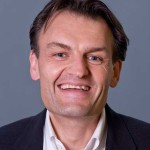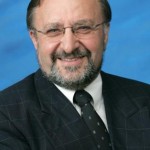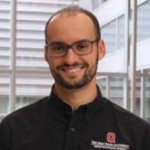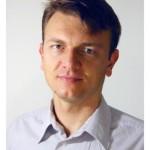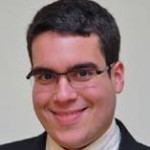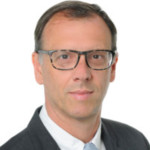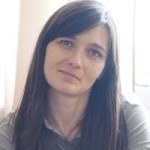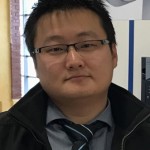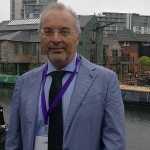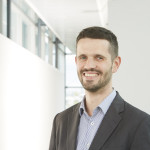2020 Edition lecturers and keynotes
KEYNOTES
 Torsten Leifert – (Volkswagen group, Germany)
Torsten Leifert – (Volkswagen group, Germany)
Professional life
since 11/2015: Volkswagen AG, Wolfsburg & Kassel
• Technical Project Manager power train inverter
• Referent onboard charger and charging strategy
since 03/2015: Member of ECPE Board of directors
2008 – 2015
SMA Solar Technology AG, Niestetal
• Project Management Corporate Technology
• Process owner FMEA / Risk and hazard Analysis
• Director Development Offgrid Systems
• Director Customer projects for Fuel Cell CHPP
2003 – 2008
SIEB & MEYER AG, Lüneburg
• Director Inverter projects Fuel Cell application and Small
wind turbines
• Business development New marktes
1995 – 2002
Firma Still / LINDE AG, Hamburg
University life
2006 – 2014
• Project Manager fork lift trucks
• Concept development power train
1989 – 1994
Assistance Lecture for real time application on μC Christian-Albrechts-University Kiel, chair of power electronics
Scientific officer at University Hannover
chair of electrical engineering, measurement & power electronic
1985 – 1988
Research assistant University Hannover
May 1995
Ph D University Hannover
„Measurement and Minimization of Orientation Errors at Field Oriented Controlled electrical drives“
Mario Paolone (EPFL, Switzerland)
Mario Paolone received the M.Sc. (with Hons.) and Ph.D. degrees in electrical engineering from the University of Bologna, Italy, in 1998 and 2002, respectively. In 2005, he was appointed Assistant Professor in power systems with the University of Bologna, where he was with the power systems laboratory until 2011. Since 2011, he joined the Swiss Federal Institute of Technology, Lausanne, Switzerland, where he is currently Full Professor and Chair of the Distributed Electrical Systems Laboratory. His research interests focus on power systems with particular reference to real-time monitoring and operation aspects, power system protections, dynamics and transients. He has authored or co-authored over 300 papers published in mainstream journals and international conferences in the area of energy and power systems that received numerous awards including the 2013 IEEE EMC Technical Achievement Award, two IEEE Transactions on EMC best paper awards and the Basil Papadias best paper award at the 2013 IEEE PowerTech. Dr. Paolone was the founder Editor-in-Chief of the Elsevier journal Sustainable Energy, Grids and Networks.
LECTURERS
 Ahmed Elasser (GE Global Research Center, USA)
Ahmed Elasser (GE Global Research Center, USA)
Dr. Ahmed Elasser received his Engineering Degree (Ingénieur D’Etat) from L’Ecole Mohammadia D’Ingénieurs, Rabat, Morocco in 1985 in Electric Power and Power Electronics. He spent seven years in Morocco working for industry and academia as a maintenance and laboratory engineer. He joined Rensselaer Polytechnic Institute in Troy, NY on a Fulbright Scholarship in 1992 and completed his MS and PhD degrees in Electric Power and Power Electronics in 1993 and 1996 respectively. He joined GE Global Research Center in 1995 as a summer intern and is currently a Principal Systems Engineer in the areas of Electric Power, Power
Electronics, and Power Semiconductor Devices. He worked on Silicon Power Devices such as IGBTs and IGCTs, Solar Energy, Silicon Carbide, Gallium Nitride, Power Conversion Systems Modeling and Simulation, and Innovation. He is currently leading the GE Renewable Reservoir Power Conversion components testing and qualification. He published over 40 papers and has 26 patents issued. Dr. Elasser is a Senior Member of IEEE and a regular reviewer for many IEEE journals and conferences in his area of expertise. Dr. Ahmed Elasser is the recipient of numerous GE Awards for his contributions and innovations over his 23 years GE career.
 Jacques Laeuffer (Paris, France)
Jacques Laeuffer (Paris, France)
Jacques Laeuffer received the Dipl.-Ing. degree in electrical engineering from Polytechnic Institute of Grenoble, France, in 1980. Then he joined Thales for radar drives. From 1984 to 1998, he was with General Electric Healthcare, as an Expert-Engineer of X-Ray generators for Medical Imaging, including Resonant Converters at 70kHz, 80kW and 150kV output. From 1999 to 2006, he worked for Peugeot-Citroen, Paris area, as Project Leader for Hybrid Cars innovation.
Since 2007, he is an International Consultant in Power Electronics for Automotive, Aeronautics, Railways, Space, Oil & Gas, Metallurgy, Robotics, Lifts and Physics Research. He is also a teacher of “EMC in Power Electronics” at CentraleSupélec, Paris-Orsay University, and an Affiliated Professor at ENSTA, Polytechnic Institute of Paris, for Electric Machines and Hybrid Cars. His activities include also Intra-Companies Trainings and Inter Companies & Universities Seminars.
Jacques is inventor of 27 granted Patents, and author of over 80 Scientific Publications. Since 2000, he is a Tutorial Instructor at PCIM Conference, Nuremberg, with “A New Design Approach for EMC and Faster Power Electronics”. In 2004, he received the “Grand Prix de l’Innovation” from Peugeot-Citroen. In 2006, he received Accreditation to supervise Research (H.D.R.) from Sorbonne University.
 Bulent Sarlioglu (University of Wisconsin–Madison, USA)
Bulent Sarlioglu (University of Wisconsin–Madison, USA)
Bulent Sarlioglu is a Professor at University of Wisconsin–Madison, and Associate Director, Wisconsin Electric Machines and Power Electronics Consortium (WEMPEC). Dr. Sarlioglu spent more than ten years at Honeywell International Inc.’s aerospace division, most recently as a staff system engineer, earning Honeywell’s technical achievement award in 2003 and an outstanding engineer award in 2011. Dr. Sarlioglu contributed to multiple programs where high-speed electric machines and drives are used mainly for aerospace and ground vehicle applications. Dr. Sarlioglu is the inventor or co-inventor of 19 US patents and many other international patents. His research areas are motors and drives including high-speed electric machines, novel electric machines, and application of wide bandgap devices to power electronics to increase efficiency and power density. He received the NSF CAREER Award in 2016 and the 4th Grand Nagamori Award from Nagamori Foundation, Japan in 2019. Dr. Sarlioglu became IEEE IAS Distinguished Lecturer in 2019. He is the technical program co-chair for ECCE 2019 and was the general chair for ITEC 2018.
 Silvio Colombi (ABB Electrification Division, Switzerland)
Silvio Colombi (ABB Electrification Division, Switzerland)
Silvio Colombi obtained a MSc Degree in Electrical Engineering in 1983 and a PhD in Control Engineering in 1997 from the Swiss Federal Institute of Technology in Lausanne (EPFL). As assistant then 1rst assistant at the Industrial Electronics Laboratory (LEI) of the Swiss Federal Institute of Technology (EPFL), he has worked on and led numerous industrial and research projects. He has worked at JET (Joint European Torus) in Abingdon (UK) on teleoperation problems in 1990 as Associated Staff and in 1993/1994 as TeleMan Fellow. At JET, he developed advanced force reflecting manipulators and controls for teleoperators. He has negotiated and carried out several European projects and many consultations for the industry. In 1994, he is scientific associate at the LEI and leads the mechatronics group. In 1996, he is lecturer of mechatronics at the EPFL and works as a part time independent consultant for the SMH Automobile in Bienne. At SMH, he developed the control of the 4 wheels traction system of the hybrid Swatchmobile car. In 1998, he joins IMV Invertomatic Technology in Riazzino as responsible for the development of new technologies. At IMV he has led the design of the new DSP based FLEX electronics for single/parallel UPSs and he developed the required control algorithms. When GE bought IMV in 2001, he becomes Manager of Advanced Development. In 2003 he is named UPS Technology Leader and in 2012 Consulting Engineer UPS and Critical Power Systems. In 2016 Silvio joins the Board of Directors of the GE Consumer & Industrial SA Switzerland. When ABB acquired GE Industrial Solutions in 2018 he joins the Electrification Products (EP) Division as a Consulting Engineer. He is the author of 40 industrial patents and more than 50 publications dealing with modeling, simulation, control, mechatronics, industrial and power electronics. He has lectured several international tutorials. Silvio is in the Board of Directors of the PCIM Europe Conference, Honorary Chairmen of the European PhD School for Power Electronics, member of the Steering Committee of EPE and Senior member of the IEEE.
 Annarita Giani (GE Global Research Center, USA)
Annarita Giani (GE Global Research Center, USA)
Annarita Giani is a Senior Scientist in the Controls and Optimization organization at GE Research in Niskayuna, NY. She joined in 2015. She currently works on supply chain optimization, industrial cybersecurity and quantum computing.
Annarita received her Laurea (Master’s degree) in Mathematics from the Università di Pisa, Italy in 1996. Thereafter, she worked as a researcher for the Instituto di Informatica e Telematica del Consiglio Nazionale delle Ricerche in Pisa. She moved to the United States to pursue a Ph.D. in Computer Engineering at Dartmouth College’s Thayer School of Engineering, she received her PhD in 2006. Her research interests included intrusion detection, security for wireless sensor networks, modeling and detection of the most modern types of computer attacks (multi stage, cognitive), covert channels, and modeling and analysis of cyber physical systems with the goal of detecting attacks. Her dissertation addresses issues relating to computer security, anomaly tracking, and cognitive attacks. She modeled computer networks and their underlying processes. She used Hidden Markov models and multi-hypothesis tracking concepts to detect multi-stage attacks.
As a postdoctoral fellow at the University of California at Berkeley from 2007 to 2011 she worked on cybersecurity of the power grid and developed a methodology to detect unobservable data integrity attacks based on the grid topology and secure sensors. During her four years at Los Alamos National Laboratory (2011-2014) she continued to investigate electric grid cybersecurity. Used physical sensor measurements to design and implement fast Phasor Measurement Unit (PMU) based techniques to detect unobservable data integrity attacks on the smart grid. Developed metrics to assess the economic and physical impact of these attacks under operator re-dispatch decisions using optimal power flow methods.
She received the Los Alamos National Laboratory Director Fellowship (2012-2014) and the GE Research Dushman Award in 2018. She has more than 50 peer reviewed publications.
 Paolo Mattavelli (University of Padova, Italy)
Paolo Mattavelli (University of Padova, Italy)
Paolo Mattavelli received the Ph. D. degree in electrical engineering from the University of Padova (Italy) 1995. From 1995 to 2001, he was a researcher at the University of Padova. From 2001 to 2005 he was an associate professor the University of Udine, where he led the Power Electronics Laboratory. In 2005 he joined the University of Padova in Vicenza with the same duties. From 2010 to 2012 he was with the Center for Power Electronics Systems (CPES) at Virginia Tech. He is currently a professor at the University of Padova, leading the Power Electronics Lab. in Vicenza.
His major field of interest includes analysis, modeling and analog and digital control of power converters, grid-connected converters for renewable energy systems and micro-grids, high-temperature and high-power density power electronics. In these research fields, he has been leading several industrial and government projects. His h-index is 69 (google scholar).
From 2003 to 2012 he served as an Associate Editor for IEEE Transactions on Power Electronics. From 2005 to 2010 he was the IPCC (Industrial Power Converter Committee) Technical Review Chair for the IEEE Transactions on Industry Applications. For terms 2003-2006, 2006-2009 and 2013-2015 he has been a member-at-large of the IEEE Power Electronics Society’s Administrative Committee. He also received in 2005, 2006, 2011 and 2012 the Prize Paper Award in the IEEE Transactions on Power Electronics and in 2007, the 2nd Prize Paper Award at the IEEE Industry Application Annual Meeting. He is an IEEE Fellow and Co-EIC for the IEEE Transactions on Power Electronics
 Giuseppe Buja (University of Padova, Italy)
Giuseppe Buja (University of Padova, Italy)
Giuseppe Buja received the “Laurea” degree (Hons.) in electronic engineering, power electronics curriculum, from the University of Padova, Padova, Italy. He has carried out extensive research in the field of power and industrial electronics, conceiving original approaches/solutions on the issues of pulse-width modulation inverters, digital signal processing for governing power electronics systems, and control of electric drives. His recent research interests are concerning with power electronics systems for emerging technologies, including wireless charging of electric vehicles and grid-integration of renewable energy sources.
Prof. G. Buja is currently an honorary research scientist of the Department of Industrial Engineering, University of Padova. He was General Chairman of the Annual Conference of the IES (IECON) and an Associate Editor of several Journals, including the IEEE Transactions on Industrial Electronics. He received the IEEE Industrial Electronics Society (IES) Dr. Ing. Eugene Mittelmann Achievement Award “in recognition of his outstanding technical contributions to the field of industrial electronics”, and the Best Paper Award from the IEEE Transactions on Industrial Electronics.
Humberto Pinheiro (UFSM, Brazil – Typhoon HIL)
Humberto Pinheiro received the B.S. degree from the Federal University of Santa Maria (UFSM), Santa Maria, Brazil, in 1983, the M.Eng. degree from the Federal University of Santa Catarina, Florianópolis, Brazil, in 1987, and the Ph.D. degree from Concordia University, Montreal, QC, Canada, in 1999. From 1987 to 1999, he was a Research Engineer with a Brazilian UPS company and a Professor with the Pontificia Universidade Católica do Rio Grande do Sul, Porto Alegre, Brazil, where he lectured on power electronics. Since 1991, he has been with UFSM. His research interests include modulation and control of static converters especially those used for the connection DER to the electric grid. Dr. Pinheiro has more than eighty journal papers and has supervised more than ten Ph.D. students. Dr. Pinheiro is a member of the IEEE Power Electronics and IEEE Industrial Electronics Societies.
2019 Edition lecturers and
KEYNOTES
Johann Walter Kolar (ETH Zurich – Switzerland)
Johann W. Kolar received his M.Sc. degree in Industrial Electronics and Control Engineering (with highest honors) and the Ph.D. degree in Electrical Engineering (summa cum laude / promotio sub auspiciis praesidentis rei publicae) from the Vienna University of Technology, Austria, in 1997 and 1999, respectively. Since 1984 he has been working as an independent researcher and international consultant in close collaboration with the Vienna University of Technology, in the fields of power electronics, industrial electronics and high performance drives. He was appointed Assoc. Professor and Head of the Power Electronic Systems Laboratory at the Swiss Federal Institute of Technology (ETH) Zurich on Feb. 1, 2001, and was promoted to the rank of Full Prof. in 2004. Dr. Kolar has proposed numerous novel converter topologies and modulation and control concepts, e.g., the VIENNA Rectifier, the SWISS Rectifier, the Delta-Switch Rectifier, the 1/3 Rectifier, the Isolated Y-Matrix AC-DC Converter, and the three-phase AC-AC Sparse Matrix Converter. He has published over 600+ scientific papers at main international conferences, 280+ papers in international journals, and 4 book chapters. Furthermore, he has filed 190+ patents. He has presented 20+ educational seminars at leading international conferences and has served as IEEE PELS Distinguished Lecturer from 2012 through 2016.
The focus of his current research is on AC-AC and AC-DC converter topologies with low effects on the mains, e.g. for data centers, More-Electric-Aircraft and distributed renewable energy systems, Solid-State Transformers for smart microgrid systems, and Inductive Power Transfer for EV/HEV charging and medical applications). Further main research areas are the realization of ultra-compact and ultra-efficient converter modules employing latest power semiconductor technology (SiC and GaN), Micro Power Electronics and/or Power Supplies on Chip, multi-domain/scale modeling/simulation and multi-objective (Pareto) optimization, as well as ultra-high speed and ultra-light weight drives, bearingless motors, and energy harvesting.
Dr. Kolar has received 11 IEEE Transactions Prize Paper Awards, 16 IEEE Conference Prize Paper Awards, the PCIM Europe Conference Prize Paper Award 2013, the SEMIKRON Innovation Award 2014, the 2014 IEEE Power Electronics Society R. David Middlebrook Achievement Award, the 2016 IEEE PEMC Council Award, and the 2016 IEEE William E. Newell Power Electronics Award. Furthermore, he received the ETH Zurich Golden Owl Award in 2011 and 2017 for Excellence in Teaching and an Erskine Fellowship from the University of Canterbury, New Zealand, in 2003. In 2006, the European Power Supplies Manufacturers Association (EPSMA) awarded the Power Electronics Systems Laboratory of ETH Zurich as the leading academic research institution in Power Electronics in Europe.
He has graduated 70+ Ph.D. students and has initiated and/or is the founder/co-founder of 4 spin-off companies targeting ultra-high speed drives, multi-domain/level simulation, ultra-compact/efficient converter systems and pulsed power/electronic energy processing.
Dr. Kolar is a Fellow of the IEEE, a Member of the IEEJ, and a member of International Steering Committees and Technical Program Committees of numerous international conferences in the field (e.g. Director of the Power Quality Branch of the International Conference on Power Conversion and Intelligent Motion). He is the founder and chair of the IEEE PELS Austria Chapter (1997-2001) and of the IEEE PELS Switzerland Chapter (2001-2011), and Chairman of the Education Chapter of the European Power Electronics (EPE) Association (since 2001). From 1997 through 2000 he has been serving as Associate Editor of the IEEE Transactions on Industrial Electronics and from 2001 through 2013 as Associate Editor of the IEEE Transactions on Power Electronics. Since 2002 he also is an Associate Editor of the Journal of Power Electronics of the Korean Institute of Power Electronics and a member of the Editorial Advisory Board of the IEEJ Transactions on Electrical and Electronic Engineering
Title of the keynote: General Properties, Scaling Laws & Inherent Limitations of Energy Electronics
Abstract
Power electronics converters are utilized in a multitude of applications for the electronic control and conversion of electric voltage and power and are reaching an increasingly higher performance, i.e. efficiency and power density at reduced costs. For each application, varieties of different converter topologies, semiconductor technologies, modulation- and control schemes, and ways of practical realization are feasible and the related details are intensively discussed at international conferences. By contrast, this talk describes the general background valid for all types of power converters, by means of elementary physical considerations and scaling laws, in order to establish a general understanding of fundamental limitations and potentials of advanced concepts such as, e.g., cellular multi-level converters.
The introductory part of the presentation explains the advantages of AC systems over DC systems in the early days of electric energy utilization and retraces the development of AC electric energy distribution in large steps. The second part focuses on the analysis of a single-phase AC/DC converter with regard to power flow pulsation and electromagnetic emissions, discusses principle advantages of SiC over Si power semiconductors, and defines the characteristic impedance of a converter, which is important for the evaluation of low-inductance packages and interconnections. The presentation continues with considerations on impedance matching, by means of parallel operation of multiple units, and a discussion of the advantages of phase-shifted operation, i.e. interleaving, with regard to switching losses and filtering effort. The third part illustrates the implications of main loss components on the resulting converter efficiency characteristic, discusses passive and active methods to filter the power pulsation with twice the mains frequency, presents a converter design by means of multi-objective optimization, and introduces the ‘Technology Node’ as a measure for characterizing the technological level of power electronics converters. Part four summarizes scaling laws and outlines possibilities for optimization of high-frequency transformers of DC/DC converters. A discussion of the ‘Hype-Cycle’ that is typically traversed after the introduction of a new technology, an outlook to important future technology domains of power electronics, represented in the form of a technology-S-curve, and an indication of future applications of power electronic converters, e.g. in the fields of green data centers, electric mobility, and More Electric Aircraft are concluding the talk.
Leo Lorenz (ECPE – Germany)
Leo Lorenz received the M.Eng. degree from Univ. of Berlin Germany in 1976 and the PhD. degree from University of Bundeswehr Munich in 1984 (Germany).
Currently he is Consultant to the Power Semiconductor Industry. From 1988 to 1998 he was Senior Director at Siemens responsible for Power Semiconductor Devices in Automotive & Industrial Application. From 1998 to 2012 he served as Senior Principle in Application and Concept Engineering for all power semiconductor Technologies in Munich/Singapore/Shanghai. In this field he has published more than 400 Journal/conference papers with a high citation rate and is the owner of many basic patents. He gave more than 80 key note presentations at high level Summits and Conferences.
Beside his work in Industry he is a Honorable/Adjunct Professor at several Universities in Germany and Worldwide . In this function he provides courses on power semiconductor technologies and supervised more than 20 PhD Students.
Dr. Lorenz is one of the Key Founder of ECPE (European Center of Power Electronics) and since the foundation in 2003 President of this organization. He is Founder/Co-founder of several conferences such as CIPS (Conference on Integrated Power Systems), PCIM Asia, ISPSD, etc. He served as General Chair of several Conferences e.g. CIPS , PCIM since 2001 and is in the Advisory Board of all of these Conferences. Dr. Lorenz received several times the best paper Award at IEEE Conferences. In 1996, he received the Siemens Innovation Award and from the German Industry Society the Innovation Award in 2002.
Beside these he received several high level IEEE Awards e.g. IEEE-ISPSD Outstanding Contributory Award in 2010 (Japan), the IEEE- Gerald Kliman Innovator Award in 2011 (USA) and the IEEE- William E. Newell Power Electronics Award in 2012 (USA), Ernst Blickle Award in 2015 (Germany), Sun Yun-Suan Honorary Professorship from Nat. Tsing Hua University TW in 2016 and a Dr. Honoris Causa nomination in 2017.
He is a distinguished lecturer at several Universities since 2003. He owns an IEEE- Fellowship since 2006 and is a Member of German Academy of Science since 2005.
LECTURERS
Marcello Canova (Ohio State University)
Marcello Canova is an Associate Professor of Mechanical and Aerospace Engineering at the Ohio State University and Associate Director for Graduate and Continuing Education at the Center for Automotive Research. He received his M.S. and Ph.D. in Mechanical Engineering in 2002 and 2006, respectively, from the University of Parma (Italy). Dr. Canova’s research spans across the fields of thermal and fluid sciences, applied mathematics, dynamical systems, optimization and control theory to improve the way we understand and control the energy conversion processes in engines, powertrains, batteries and fuel cells. His research interests are in the energy optimization and management of ground vehicle propulsion systems, including internal combustion engines, hybrid-electric drivetrains, energy storage systems, waste heat recovery and powertrain thermal management. In these areas, he leads a number of projects funded by, among others, Ford Motor Company, General Motors, Fiat Chrysler Automobiles, Honda of America, the National Science Foundation, ARPA-E and the US Department of Energy. Dr. Canova’s work in powertrain control, ancillary loads reduction and thermal management has led to fuel economy improvements and has been implemented in production programs by major OEMs. In addition, he has published over 110 articles in refereed journals and conference proceedings. Dr. Canova is a 2016 NSF CAREER Award recipient, and he received the Kappa Delta Distinguished Faculty Award (2009), the SAE Vincent Bendix Automotive Electronics Engineering Award (2009), the Lumley Interdisciplinary Research Award (2009), the SAE Ralph E. Teetor Educational Award (2016), the Lumley Research Award (2016) and the Michael J. Moran Award for Excellence in Teaching (2017).
Title of the lecture: Electrochemical Energy Storage Systems for Stationary and Dynamic Applications
Abstract
- IntroductGeneral Properties, Scaling Laws & Inherent Limitations of Energy Electronicsion and basic operations of Lithium ion cells
- Modeling of Lithium ion cells: equivalent circuit vs. electrochemical models
- State of Charge estimation: problem description and methods for solution
- Introduction to battery degradation processes, aging and second-life
Drazen Dujic (EPFL – Switzerland)
Drazen Dujic is an Assistant Professor and Head of the Power Electronics Laboratory at EPFL. He received the Dipl.Ing. and MSc degrees from the University of Novi Sad, Novi Sad, Serbia in 2002 and 2005, respectively, and the PhD degree from Liverpool John Moores University, Liverpool, UK in 2008. From 2003 to 2006, he was a Research Assistant with the Faculty of Technical Sciences at University of Novi Sad. From 2006 to 2009, he was a Research Associate with Liverpool John Moores University. After that he moved to industry and joined ABB Switzerland Ltd, where from 2009 to 2013, he was Scientist and then Principal Scientist with ABB Corporate Research Center in Baden- Dättwil, and from 2013 to 2014 he was R&D Platform Manager with ABB Medium Voltage Drives in Turgi. He is with EPFL since 2014. His research interests include the areas of design and control of advanced high power electronic systems and high-performance drives, predominantly for the medium voltage applications related to electrical energy generation, conversion and storage. He has authored or co-authored more than 100 scientific publications and has filed twelwe patents. In 2018 he has received EPE Outstanding Service Award and in 2014, the Isao Takahashi Power Electronics Award for Outstanding Achievement in Power Electronics,. He is Senior Member of IEEE, EPE Member, and serves as Associate Editor for IEEE Transactions on Power Electronics, IEEE Transactions on Industrial Electronics, IET Electric Power Applications and EPE Journal.
Title of the lecture: Medium Frequency Transformer Design Optimization for Solid State Transformers
Abstract
With increased interest in Solid State Transformers, several technical problems arise related to actual realization of these technologies. Irrespectively of adopted power electronic topologies, these structures are characterized as being modular and having inherently built-in galvanic isolation at medium or high frequency. Designing a high-power high-voltage medium frequency transformer is associated with multiple technical challenges related to electrical, magnetic, dielectric and thermal performance limits encountered in the system. Various technological choices must be carefully considered and selected before being included into a generic multi-objective optimization. Lecture will provide an overview and address challenges coming from the application area, characteristics of involved materials and available design choices, associated modelling of different elements impacting medium frequency transformer design, as well as optimization process as whole. Multiple illustrative design examples will be critically analysed in terms of their key performance indicators, and supported with practical examples realized in the laboratory.
Bernd Neuner (ZES ZIMMER Electronic Systems GmbH – Germany)
Bernd Neuner received his Diploma in Computer Science from Julius-Maximilians-Universität in Würzburg, Germany. In 1997, he joined Wandel & Goltermann, a leading manufacturer of communications test solutions, where he took on a pivotal role to implement project management for data communications test & measurement solutions, moving to monitoring solutions for CATV triple-play architectures later on. From 2003 on he shifted his focus to power electronics, working for a leading manufacturer of laboratory power supplies, Elgar Electronics, which later was absorbed by Ametek Programmable Power. His fields of interest included power test systems for the automotive, defense and aerospace industry, among others the rigorous test procedures for the upcoming Airbus A380, the world’s largest passenger airliner. He also worked with the international space industry on solar array and battery simulation for NASA/ESA and other missions. In 2009 Neuner joined Tigo Energy, a Silicon Valley startup company determined to revolutionize the distributed generation of solar energy. He was building the European footprint of Tigo Energy and worked with industry associations to gain a wider acceptance of module-level control of photovoltaic energy generation in order to increase yield, improve safety and simplify maintenance, thus increasing the acceptance of solar energy across Europe. In 2013, he returned to power electronics test & measurement, joining ZES ZIMMER, a leading German manufacturer of power analyzers devoted to reaching new breakthroughs in the accuracy, reliability and ease-of-use of power measurement.
Title of the lecture: A holistic testing approach for electric drive systems
Abstract
The electric testing needs for drive systems have evolved far beyond the mere measurement of voltage and current. What could be considered traditional power measurement now represents only one out of several clearly distinct stages of electrical testing. Each one of these stages comes with its own challenges, which are exacerbated by the very developments that make precise measurement more indispensable than ever before: the race towards higher efficiencies, bringing ever increasing switching speeds in its wake. We will be introducing a five-stage model to describe test procedures for electric equipment and will be looking at specific examples to make visible the challenges occurring in each one of those phases to create awareness for potential pitfalls and mistakes on the way to a reliable assessment of power, losses, efficiencies and electromagnetic compliance of electric drive systems.
Ilknur Colak (Maschinenfabrik Reinhausen)
Ilknur Colak received her MSc. and PhD. in electrical engineering from Istanbul Technical University, Istanbul, Turkey. From 1998 to 2000 she worked as a teaching assistant in the Informatics Institute of Istanbul Technical University. After following two years of power electronics research engineering experience in industry, she worked as a research scientist in TUBITAK (The Scientific and Technological Research Council of Turkey) where she was responsible of high power resonant converters, hybrid/electrical vehicles, drives for power traction applications, battery chargers for military applications, etc. From 2008 to 2010 she worked as an R&D manager in OZDISAN where she was leading a power electronics research team in the field of DC/DC converters, inverters, UPS, etc. She was also responsible for knowledge management and education of engineers within the company. In 2010 she joined to CERN (The European Organization for Nuclear Research) as a research scientist where she designed the first space vector modulation controlled multilevel converter for the LHC accelerators. Between 2012 and 2016 Dr. Colak worked with ABB Power Converter Solutions group, Turgi, Switzerland, as senior lead researcher, where she was working on high power modular multilevel converter for medium voltage applications. As a system research engineer, her research area includes modulation methods, transformerless concepts, high power resonant converters, NPC, ANPC, MMC topologies, insulation coordination, EMC and grounding on high power applications, reliability of power electronics systems, solar and wave energy conversion systems. She is main author of many scientific papers and the invertor or two patent applications. Since November 2016 Ilknur Colak is with Maschinenfabrik Reinhausen – MR as Team Leader and Project Manager.
Title of the lecture: Insulation and coordination design steps for MV power electronics applications
Abstract
Insulation and coordination design is one of the most important topics which needs to be considered at the beginning stage of a power electronics system design. This tutorial reviews the fundamentals of insulation and coordination and defines the relevant norms, requirements and standards for high power medium voltage power electronics systems. The tutorial is intended to address the design steps to provide required clearance and creepage distances through some examples. This guide covers also the electrical tests and measurements to fulfil the electrical withstand capability for a given medium voltage application example. Finally, the insulation and coordination regulations for medium voltage power electronics systems and the differences between the regulations are presented in the tutorial. The scope of the lecture would be very valuable to those power electronics engineers, mechanical engineers and students from university and industry who face with the design problems of implementing insulation and coordination requirements in their applications and who need a guide to the methods that can be used straight away without performing complex mathematics.
Content: – Introduction – Overview on Insulation and Coordination Basics Overvoltage category Pollution degree Decisive voltage class Material class Altitude Accessibility Earthing connection type Electric field conditions Voltage class Insulation types Direct/Indirect Connection Creepage distance Clearance distance – Design Process Preparing the protection requirements table Calculation of node-to-node voltages Calculation of creepage distances Calculation of clearance distances – Tests and Measurements for Electrical Withstand Capability Impulse Withstand Voltage Test AC and DC Withstand Voltage Test Partial Discharge Test – Related Standards and Deviation Between Standards – Summary
Samuel Araujo (Robert Bosch GmbH)
Samuel Araujo received his Bachelor Degree in Electrical Engineering in Brazil in 2004, followed by a M.Sc. on Renewable Energies and Energy Efficiency at the University of Kassel in 2007. He finished his Ph.D. degree at the same university on 2013, investigating the potential of wide-bandgap devices on renewable energy sources. From 2012 until 2016, he worked as a research group leader at the Centre of Competence for Distributed Electric Power Technology (KDEE) at the University of Kassel, being responsible for the development of power electronic circuits in partnership with the industry. Since 2016, he is working at Robert Bosch GmbH in the Corporate Sector Research and Advance Engineering, assuming the coordination of the power electronics team in the middle of 2017. His main fields of interest are the design and optimization of power circuits and the investigation of innovative semiconductors devices.
Title of the lecture: Outlook on electric mobility and power electronics
Abstract
The adoption of electric mobility is taking pace all over the world in face of pressing environmental issues as well as new user demands. Power electronics is a key technology towards a cost-effective and resource-friendly fulfillment of such goals. This course will start by presenting an overview of mobility concepts and their demands, focusing on the most recent developments of power electronics. The impact of new device technologies and topologies will be presented, depicting the main challenges for the realization of more compact and efficient conversion stages and drives. An outlook of future developments on the medium and long term will be presented, showing key research issues to be addressed in the next decades.
Sasa Djokic (University of Edinburgh-UK)
Dr Sasa Djokic received Dipl. Ing. and M. Sc. degrees in electrical engineering from the University of Nis, Nis, Serbia, in 1992 and 2001, and Ph. D. degree in the same area from the University of Manchester Institute of Science and Technology (UMIST), Manchester, United Kingdom, in 2004. Currently, he is a Reader in Electrical Power Systems at the University of Edinburgh, Scotland, UK. He is a Senior Member of the IEEE Power Engineering Society and member of IET and is involved with a number of CIGRE, IEEE, IEC and other international Working Groups and Committees. His research interests include: Power Quality and Reliability Analysis of Power Systems, Modelling and Representation of Renewable-based Distributed Generation and Storage Systems, “Smart Grids”, Load Modelling, Load Profiling and Demand Side Management
Title of the lecture: Electrification of Road Transportation Sector: Impact of Electric Vehicles on Distribution Networks
Abstract
Electric vehicles (EVs) are widely recognised as one of the most promising technologies for reducing fossil fuel dependency and emissions of greenhouse gasses (GHG) in the road transportation sector, which is the only major sector where current GHG emissions are well above the 1990 levels. However, the further uptake and deployment of EVs require connection of large number of EV battery chargers, which will present a considerable challenge for the operation of existing distribution networks, as these loads might cause significant changes in power flows, with a further strong impact on the network voltage profiles, loading of network components, harmonic distortion levels and overall supply system performance. Currently, these changes are not fully understood.
Practically all car manufacturers are now offering different models of fully-electric and hybrid EVs, ranging from small and medium size passenger cars, through sport cars and sub-urban vehicles (SUVs), to vans and (mini)buses, which generally utilise different on-board EV battery chargers. The lecture will first introduce EV battery chargers as a new type of the load in modern distribution networks. Based on the extensive measurements of around 20 different types of on-board EV chargers, representing majority of EVs currently available in the EU market, the lecture will first discuss similarities and differences in their characteristics. Afterwards, it will be shown how complex and sophisticated power electronic and control circuits of different EV chargers can be classified into a small number of “generic types” and how the simplified “generic EV charger models” can be developed and used for different network studies, e.g. active/reactive power demand models, voltage-dependent load models, frequency-domain models, dynamic models for system reliability, security and stability assessment and high-frequency harmonic emission models.
Due to inherently stochastic nature of use of EVs, reflected in uncertainties in arrival and departure times, as well as travelled distances, charging locations and state of charge of batteries, the lecture will discuss how appropriate probabilistic models can be developed for the analysis of the aggregate impact of EV chargers, which should be considered together with the other types of loads connected in residential and commercial load sectors. Finally, implementation of flexible charging schemes for e.g. shifting EV loads to night hours and reducing differences between the minimum and maximum system demands, or for preventing curtailment of renewable energy and providing new balancing and ancillary services to network operators will be discussed for a selected number of EV charging scenarios, including use of EV batteries as a distributed energy storage in so called “vehicle-to-grid” applications.
Massimiliano Visintin – (General Electric – Switzerland)
Massimiliano Visintin (1965) received the MS degree in Electric Engineering from University of Trieste, Italy, a PhD in Power Electronics from the Swiss Federal Institute of Technology Lausanne (EPFL), Lausanne, Switzerland and a MBA from Bocconi University in Milano, Italy.
He joined Ansaldo in 1991 and was involved in the field of electric machines and monitoring systems, power electronics and controls such as high-power variable-frequency drives. In 2001 joined Alstom as electric calculation group leader of the generator group, in 2005 became the motor and generator engineering manager in ASI-Nidec and from 2008 he is the head of product development for generator and monitoring systems in GE Service. He has authored or co-authored several publications on electric machines and variable speed drives, power electronics, applications and monitoring systems and he holds more than 20 patents ranging from electric machines to power electronic controls and monitoring devices.
Title of the lecture: Design and qualification of inverter fed electric machines
Abstract
The different requirements and challenges faced during the design of electric machines will be presented and discussed in case of frequency converter feeding. Product qualification and tests will be considered too.
Elena Breaz (University of Technology of Belfort- Montbeliard – France )
Elena Breaz is currently an associate professor at the University of Technology of Belfort-Montbeliard (UTBM), Belfort, France. She received the Master degree in electrical engineering from Technical University of Cluj-Napoca in 2009 and the PhD degree in engineering science in 2012 from the same university in Romania. Her main research areas include fuel cell modeling, electric hybrid vehicle design and real time simulation technology for energy systems. Since 2012, she is also a faculty member of the electrical engineering department of Technical University of Cluj-Napoca.
Fei Gao (University of Technology of Belfort- Montbeliard – France )
Prof. Fei Gao received the Master’s degree in electrical and control system engineering in 2007, and the Ph.D. degree in renewable energy with distinguished Youth Doctor Award in 2010, both from the University of Technology of Belfort-Montbeliard (UTBM), Belfort, France. He is currently a Full Professor and the Head of the Energy Production Division at the School of Energy and Computer science of UTBM, where he was an Associate Professor between 2011 and 2017. Prof. Gao is the Fellow of IET and the holder of the French research expertise bonus (PEDR) by the French Ministry of Higher Education and Research. He is also the Editor-in-Chief (2019-2021) of IEEE Industrial Electronics Technology News, and an Associate Editor of IEEE Transactions on Industrial Electronics, IEEE Transactions on Industry Applications and IEEE Transactions on Transportation Electrification, and the Chair of fuel cell system architecture optimization research axis of the national Fuel Cell Research Federation FCLAB in France. He is nominated in 2017 as Conferences/Workshops Committee Chair of IEEE Transportation Electrification Community, and serve since 2018 as Chair of the Technical Committee on Transportation Electrification of the IEEE Industry Electronic Society.
Title of the lecture: Fuel Cell Technology for Automotive applications
Abstract
The fuel cell is a potential candidate for energy storage and conversion in our future energy mix. Indeed, a fuel cell is able to directly convert the chemical energy stored in fuel (e.g. hydrogen) into electricity, without undergoing different intermediary conversion steps. Among the different fuel cell types, the proton exchange membrane (PEM) fuel cell has shown great potential in automotive applications, due to its low operating temperature, solid-state electrolyte, and compactness. Many experts consider the PEM fuel cells to be one of the potential embarked energy candidates for terrestrial transportation.
This lecture will mainly focus on the proton exchange membrane (PEM) fuel cell technology which has been used specially in automotive applications. The PEM fuel cell fundamentals, such as its physics, structure, power characteristics, efficiency, will be presented and discussed. The fuel cell system with its key ancillary components, such as air compressor, hydrogen tank, power converter, will also be introduced. Different powertrain configurations with fuel cells in automotive applications will be discussed and shown with real examples around the world. An emphasis on the fuel cell economic aspects and a short introduction to hydrogen economy will be given at last.
Mario Saggio (ST Microelectronics)
Mario Saggio, R&D Design Director in STMicroelectronics. Physics Degree at Catania University in 1991. He worked as Research Scientist at CNR IMETEM Catania in 1992-93 and at Fraunhofer Institute IIS-B in Erlangen Germany in 1994. From 1995 he has a permanent position in STMicroelectronics R&D Department in Catania, in New Power Devices Design Group. In ST he worked on technology development of new Fast IGBTs based on innovative concepts for carrier lifetime control. He coordinated and leaded the team designing and industrializing superjunction MOSFETs (MDmeshTM technology). Since 1999 he started a pioneer work on Silicon Carbide (SiC) in order to put technological bases for SiC Power Devices development in ST. From 2005 to 2012 he leaded the ST R&D High Voltage Device Design team. From 2013 he leads the ST R&D Silicon Carbide Power Device Design Group. He is author of 30 patents on device structures in Silicon and in Silicon Carbide. He is author or coauthor of 40 peer reviewed papers in international journals or conference.
Title of the lecture: Silicon Carbide Power Devices: Technologies and Applications
Abstract
The advantage of using Silicon Carbide devices in Power Electronics will be described by looking to technology features and application request. SiC MOSFETs and Diodes activity and roadmaps together with the effort done by ST to introduce this technologies in high volume market will be also presented.
2018 Edition Lecturers
Claus Müller (Siemens AG)
Keynote Title: Opportunities and Challenges of Electric Aircraft Propulsion
Engineer’s degree, Electrical Engineering, Munich, 1997
PhD degree, Electrical Engineering, Munich, 2008
Control of a CVT-based hybrid drivetrain
Project Manager, Deutsche Bahn, Munich, 2003 – 2010
EMU procurement project, Repowering projects
Head of Power Electronics, Compact Dynamics, Starnberg, 2011 – 2013
Motor integrated power electronics mainly for motorsport application
Engineer Innovation, Knorr-Bremse, Munich, 2013 – 2017
Advanced innovation projects in the area of controls and actuators
Head of Aircraft Drives and Controls, Siemens eAircraft, Munich, since 2017
Control and power electronics for electric aircraft propulsion systems
Leo Lorenz (ECPE)
Keynote Title: Power Semiconductor Devices: Key Technology Driver for Future Power Electronic System Development
Leo Lorenz received the M.Eng. degree from Univ. of Berlin Germany in 1976 and the PhD. degree from University of Bundeswehr Munich in 1984 (Germany).
Currently he is Consultant to the Power Semiconductor Industry. From 1988 to 1998 he was Senior Director at Siemens responsible for Power Semiconductor Devices in Automotive & Industrial Application. From 1998 to 2012 he served as Senior Principle in Application and Concept Engineering for all power semiconductor Technologies in Munich/Singapore/Shanghai. In this field he has published more than 400 Journal/conference papers with a high citation rate and is the owner of many basic patents. He gave more than 80 key note presentations at high level Summits and Conferences.
Beside his work in Industry he is a Honorable/Adjunct Professor at several Universities in Germany and Worldwide . In this function he provides courses on power semiconductor technologies and supervised more than 20 PhD Students.
- Dr. Lorenz is one of the Key Founder of ECPE (European Center of Power Electronics) and since the foundation in 2003 President of this organization. He is Founder/Co-founder of several conferences such as CIPS (Conference on Integrated Power Systems), PCIM Asia, ISPSD, etc. He served as General Chair of several Conferences e.g. CIPS , PCIM since 2001 and is in the Advisory Board of all of these Conferences. Dr. Lorenz received several times the best paper Award at IEEE Conferences. In 1996, he received the Siemens Innovation Award and from the German Industry Society the Innovation Award in 2002.
Beside these he received several high level IEEE Awards e.g. IEEE-ISPSD Outstanding Contributory Award in 2010 (Japan), the IEEE- Gerald Kliman Innovator Award in 2011 (USA) and the IEEE- William E. Newell Power Electronics Award in 2012 (USA), Ernst Blickle Award in 2015 (Germany), Sun Yun-Suan Honorary Professorship from Nat. Tsing Hua University TW in 2016 and a Dr. Honoris Causa nomination in 2017.
He is a distinguished lecturer at several Universities since 2003. He owns an IEEE- Fellowship since 2006 and is a Member of German Academy of Science since 2005.
2018 Edition Lecturers
Emil Levi (Liverpool John Moores University, UK )
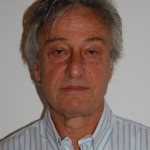 Emil Levi received the Dipl. Ing. degree in electrical engineering from the University of Novi Sad, Yugoslavia, in 1982, and MSc and the PhD degrees in Electrical Engineering from the University of Belgrade, Yugoslavia in 1986 and 1990, respectively. From 1982 till 1992 he was with the Dept. of Elec. Engineering, University of Novi Sad. He joined Liverpool John Moores University, UK in May 1992 and is since September 2000 Professor of Electric Machines and Drives. Emil is a Fellow of the IEEE (Class of 2009). He served as a Co-Editor-in-Chief of the IEEE Trans. on Industrial Electronics in the 2009-2013 period and is currently Editor-in-Chief of the IET Electric Power Applications and an Editor of the IEEE Trans. on Energy Conversion. He is the recipient of the Cyril Veinott award of the IEEE Power and Energy Society for 2009 and the Best Paper award of the IEEE Trans. on Industrial Electronics for 2008. In 2014 he received the “Outstanding Achievement Award” from the European Power Electronics (EPE) Association.
Emil Levi received the Dipl. Ing. degree in electrical engineering from the University of Novi Sad, Yugoslavia, in 1982, and MSc and the PhD degrees in Electrical Engineering from the University of Belgrade, Yugoslavia in 1986 and 1990, respectively. From 1982 till 1992 he was with the Dept. of Elec. Engineering, University of Novi Sad. He joined Liverpool John Moores University, UK in May 1992 and is since September 2000 Professor of Electric Machines and Drives. Emil is a Fellow of the IEEE (Class of 2009). He served as a Co-Editor-in-Chief of the IEEE Trans. on Industrial Electronics in the 2009-2013 period and is currently Editor-in-Chief of the IET Electric Power Applications and an Editor of the IEEE Trans. on Energy Conversion. He is the recipient of the Cyril Veinott award of the IEEE Power and Energy Society for 2009 and the Best Paper award of the IEEE Trans. on Industrial Electronics for 2008. In 2014 he received the “Outstanding Achievement Award” from the European Power Electronics (EPE) Association.
His areas of research interest include electric machines, power electronic converters, and variable speed electric drives/generation systems. For the last 15 years he has been involved in research related to modeling and control of multiphase variable speed drives and generation systems. He has published more than 370 papers, including over 70 full IEEE Transactions papers.
Title of the lecture: Multi-phase drive and generation systems for advanced industrial applications
Abstract
Although multiphase (more than three phases) machines have been known for almost half a century, it is only in recent times that they are becoming more wide-spread in industrial applications. In addition to the obvious advantage of reducing the required power-per-phase and hence required semiconductor rating, multiphase systems offer a number of other advantages that make them suitable for specific but important niche applications. These all stem from the fact that, regardless of the number of stator phases, independent flux and torque control of an ac machine always requires only two independently controllable currents (two degrees of freedom). The remaining degrees of freedom can then be used for other purposes and this will be the subject of this lecture.
The lecture will commence with an introduction to the types of multiphase machines, principles of multiphase machine modelling, vector control, and multiphase voltage source inverter PWM schemes. ‘Classical’ (i.e. older) uses of additional degrees of freedom will be addressed next, including the multi-motor multiphase series-connected drive systems with reduced-switch-count inverter supply, use of the additional degrees of freedom for the purposes of achieving fault-tolerant operation, and torque enhancement or torque ripple smoothing by low order stator current harmonic injection. Next, more recent applications of the additional degrees of freedom will be considered. This encompasses capacitor voltage balancing in machines with multiple three-phase windings and multiple three-phase converters connected in series, realisation of fully integrated on-board fast (three-phase) and slow (single-phase) battery charging systems in electric vehicles, power sharing between three-phase windings in a multiphase machine with a multitude of said sub-windings, a braking method for induction motor drives with diode front-end rectifier, and stator winding temperature estimation. Basic concepts will be explained and illustrative examples will be provided throughout.
Francisco D. Freijedo (Power Electronics Laboratory, EPFL – Switzerland)
 Dr. Francisco D. Freijedo is a Scientist in the Power Electronics Laboratory at at Swiss Federal Institute of Technology (EPFL) in Lausanne, Switzerland, where he is engaged in research activities in the broad field of electrical energy generation, conversion and storage, with focus on medium voltage high power applications. He has received his BSc degree in Physics (Electronics Branch) from the University of Santiago de Compostela, Spain in 2002 and his PhD degree from the University of Vigo, Spain in 2009. Before joining the EPFL, from 2005 to 2011 he was an Assistant Lecturer at the University of Vigo; from 2011 to 2014 he worked as an R&D Engineer at Gamesa Innovation and Technology, where he developed power electronics controllers for wind turbine applications; In 2014-2015 he was at the Aalborg University as a Postdoc researcher, involved in activities related to harmonic instability in power plants and also in microgrids. His research interests are in areas of modeling and control for power electronics systems, having broad experience with many different technologies and applications. His current activities are funded by the Swiss Federal Office of Energy and mostly related to enabling technologies for MVDC conversion systems. He is IEEE Senior Member and he authored or co-authored more than 100 peer-reviewed scientific publications.
Dr. Francisco D. Freijedo is a Scientist in the Power Electronics Laboratory at at Swiss Federal Institute of Technology (EPFL) in Lausanne, Switzerland, where he is engaged in research activities in the broad field of electrical energy generation, conversion and storage, with focus on medium voltage high power applications. He has received his BSc degree in Physics (Electronics Branch) from the University of Santiago de Compostela, Spain in 2002 and his PhD degree from the University of Vigo, Spain in 2009. Before joining the EPFL, from 2005 to 2011 he was an Assistant Lecturer at the University of Vigo; from 2011 to 2014 he worked as an R&D Engineer at Gamesa Innovation and Technology, where he developed power electronics controllers for wind turbine applications; In 2014-2015 he was at the Aalborg University as a Postdoc researcher, involved in activities related to harmonic instability in power plants and also in microgrids. His research interests are in areas of modeling and control for power electronics systems, having broad experience with many different technologies and applications. His current activities are funded by the Swiss Federal Office of Energy and mostly related to enabling technologies for MVDC conversion systems. He is IEEE Senior Member and he authored or co-authored more than 100 peer-reviewed scientific publications.
Title of the lecture: Grid Connected Converters
Abstract
Integration of renewable energy sources in the AC grid is requires carefully consideration of the energy source characteristics, capabilities of the power electronic conversion technologies and continuous monitoring of the grid conditions. The course will cover topics related to the design, control and integration of the power electronic converters for the renewable grid connected applications. For the sake of clarity and simplicity, an LCL filter grid connected double-stage photovoltaic (PV) system will serve as a base for discussion. More specifically, course will cover: power electronic converter operating principles, pulse width modulation, modeling and control in s-domain and z-domain, phase locked loops, LCL filter design, PI and PR type of regulators and corresponding closed loop control loops. PLECS examples will accompany various theoretical developments.
Ilknur Colak – (Maschinenfabrik Reinhausen GmbH, Germany)
 Ilknur Colak received her MSc. and PhD. in electrical engineering from Istanbul Technical University, Istanbul, Turkey. After following two years of power electronics research engineering experience in industry, she worked as a research scientist in TUBITAK (The Scientific and Technological Research Council of Turkey) where she was responsible of high power resonant converters, hybrid/electrical vehicles, drives for power traction applications, battery charging system for military applications, etc. From 2008 to 2010 she worked as an RnD manager in OZDISAN where she was leading a power electronics research team in the field of DC/DC converters, inverters, UPS, etc. Between 2010 and 2012 she worked at CERN (The European Organization for Nuclear Research) as a research fellow where she designed the first space vector modulation controlled multilevel converter for the LHC accelerators. Between 2012 and 2016 Colak worked with ABB Power Converter Solutions group, Turgi, Switzerland, as senior lead researcher, where her main focus was on modular multilevel converters for medium voltage applications. Her research area includes multilevel (MMC, NPC, ANPC) topologies, modulation schemes, transformerless concepts, high power resonant converters, insulation and coordination, EMC and grounding, reliability, and wave energy conversion systems. Since November 2016 she is with Maschinenfabrik Reinhausen – MR, as Power Electronics – Project Manager.
Ilknur Colak received her MSc. and PhD. in electrical engineering from Istanbul Technical University, Istanbul, Turkey. After following two years of power electronics research engineering experience in industry, she worked as a research scientist in TUBITAK (The Scientific and Technological Research Council of Turkey) where she was responsible of high power resonant converters, hybrid/electrical vehicles, drives for power traction applications, battery charging system for military applications, etc. From 2008 to 2010 she worked as an RnD manager in OZDISAN where she was leading a power electronics research team in the field of DC/DC converters, inverters, UPS, etc. Between 2010 and 2012 she worked at CERN (The European Organization for Nuclear Research) as a research fellow where she designed the first space vector modulation controlled multilevel converter for the LHC accelerators. Between 2012 and 2016 Colak worked with ABB Power Converter Solutions group, Turgi, Switzerland, as senior lead researcher, where her main focus was on modular multilevel converters for medium voltage applications. Her research area includes multilevel (MMC, NPC, ANPC) topologies, modulation schemes, transformerless concepts, high power resonant converters, insulation and coordination, EMC and grounding, reliability, and wave energy conversion systems. Since November 2016 she is with Maschinenfabrik Reinhausen – MR, as Power Electronics – Project Manager.
Title of the lecture: EMC Design Fundamentals for Power Electronic Converters
Abstract
This lecture is intended to cover the electromagnetic theory needed to understand the phenomena that lead to EMC problems in power electronic converters and to explain the related EMC design steps based on theoretical explanations, practical examples and IEC standards. It describes how EMC applies to systems and installations, and also explains proven best EMC practices to alleviate the problems. The presentation aims to give a guide to the methods that can be used straight away without performing complex simulations during the design phase.
Contents: The tutorial focuses on the practical electromagnetic design issues on power electronic converters. The main contents of the proposed tutorial are described in the following outline.
- Introduction
- Overview on Electromagnetic Basics
- – Absorptivity, reflectivity and transmissivity
- – Shielding
- – Eddy currents
- – Skin effect
- – Proximity effect
- – Magnetic conduit effect
- Coupling Mechanisms
- – Radiative coupling
- – Near field coupling
- – Conductive coupling
- – Reducing inductive and capacitive couplings
- Design Process
- – Pre-study (Identify the requirements from the related standards)
- – EMC related – System design
- – EMC related – Electrical design
- Zoning
- Cable segregation and routing
- Bonding and straps
- Grounding on PCB level
- Grounding on system level
- Shielding
- – EMC related – Mechanical design
- Apertures
- Seams
- Cable penetrations
- Corrosion
- Mitigation Methods and Best Application Practices
- Related Standards and Tests
- Summary
Christian Haag (Flexible Electrical Networks (FEN) GmbH)
 Dr.-Ing. Christian Haag is the managing director of Flexible Electrical Networks (FEN) GmbH, affiliated with FEN Research Campus. FEN is a joint association comprising 15 institutes of RWTH Aachen University and 25 industry partners. Dr. Haag is active as an adjunct professor at the School of Business at the University of Alberta (UoA). From 2011 to 2016, he worked as a project leader for RWTH Aachen Campus GmbH. Since 2017, he is a member of ETIP SNET innovation implementation in the business environment. Since 2016, he also works as a mentor for the RWTH Aachen Entrepreneurship Center where he is responsible for start-up consulting and support in the field of energy technology. Since 2013, Dr. Haag is a member of the technical commission for electro mobility of the city of Aachen as well as member of the board of trustees of Energeticon gGmbH (chair since 2016). From 2008 to 2013, Dr. Haag earned his PhD in the field of production engineering at the Laboratory for Machine Tools and Production Engineering (WZL), following his graduation from RWTH Aachen University (engineering diploma in sustainable management) in 2008. He also completed an MBA at RWTH Aachen and University of St. Gallen from 2015 to 2017.
Dr.-Ing. Christian Haag is the managing director of Flexible Electrical Networks (FEN) GmbH, affiliated with FEN Research Campus. FEN is a joint association comprising 15 institutes of RWTH Aachen University and 25 industry partners. Dr. Haag is active as an adjunct professor at the School of Business at the University of Alberta (UoA). From 2011 to 2016, he worked as a project leader for RWTH Aachen Campus GmbH. Since 2017, he is a member of ETIP SNET innovation implementation in the business environment. Since 2016, he also works as a mentor for the RWTH Aachen Entrepreneurship Center where he is responsible for start-up consulting and support in the field of energy technology. Since 2013, Dr. Haag is a member of the technical commission for electro mobility of the city of Aachen as well as member of the board of trustees of Energeticon gGmbH (chair since 2016). From 2008 to 2013, Dr. Haag earned his PhD in the field of production engineering at the Laboratory for Machine Tools and Production Engineering (WZL), following his graduation from RWTH Aachen University (engineering diploma in sustainable management) in 2008. He also completed an MBA at RWTH Aachen and University of St. Gallen from 2015 to 2017.
Christoph Loef (Institute for Power Electronics and Electrical Drives (ISEA) – RWTH Aachen, Germany)
 Dipl. Ing. Christoph Loef is permanent research staff member at the Institute for Power Electronics and Electrical Drives (ISEA) of RWTH Aachen University since 2010. Since 2015, he organizes the low voltage activities within the FEN Research Campus on electrical DC grids. From 1990 to 2010, Mr. Loef worked as a senior scientist at Philips Research Laboratories Aachen. Prior to that, he studied electrical engineering at the University of Applied Sciences Aachen, graduating in 1989. His research areas comprise resonant and non-resonant power converters, EMC problems and contactless energy transmission as well as aspects of future low voltage DC grids. He is a member of the IEC systems committees LVDC (SyC LVDC) to provide systems level standardization, coordination and guidance in the areas of low voltage direct current and low voltage direct current for electricity access. Mr. Loef holds more than 40 patents and has published several conference papers in the field of power electronics.
Dipl. Ing. Christoph Loef is permanent research staff member at the Institute for Power Electronics and Electrical Drives (ISEA) of RWTH Aachen University since 2010. Since 2015, he organizes the low voltage activities within the FEN Research Campus on electrical DC grids. From 1990 to 2010, Mr. Loef worked as a senior scientist at Philips Research Laboratories Aachen. Prior to that, he studied electrical engineering at the University of Applied Sciences Aachen, graduating in 1989. His research areas comprise resonant and non-resonant power converters, EMC problems and contactless energy transmission as well as aspects of future low voltage DC grids. He is a member of the IEC systems committees LVDC (SyC LVDC) to provide systems level standardization, coordination and guidance in the areas of low voltage direct current and low voltage direct current for electricity access. Mr. Loef holds more than 40 patents and has published several conference papers in the field of power electronics.
Gonca Gürses (Flexible Electrical Networks (FEN) GmbH)
 M. Sc. Gonca Gürses is research associate at the FEN Research Campus since 2016 and started her PhD under the supervision of Prof. Antonello Monti (ACS – RWTH Aachen). Ms. Gürses graduated in 2016 with her master’s degree in electrical engineering and business administration at RWTH Aachen University after having completed the bachelor’s degree in the same course in Aachen in 2013. Her field of research focuses on reliable and sustainable innovative electric systems. Earlier she worked on voltage regulated distribution transformers and control systems with high shares of sensors. Until recently, she was responsible for prequalification of technical assets for ancillary services. During her studies she received several scholarships for her year abroad at Queensland University of Technology (QUT) and her research activities at ETH Zurich.
M. Sc. Gonca Gürses is research associate at the FEN Research Campus since 2016 and started her PhD under the supervision of Prof. Antonello Monti (ACS – RWTH Aachen). Ms. Gürses graduated in 2016 with her master’s degree in electrical engineering and business administration at RWTH Aachen University after having completed the bachelor’s degree in the same course in Aachen in 2013. Her field of research focuses on reliable and sustainable innovative electric systems. Earlier she worked on voltage regulated distribution transformers and control systems with high shares of sensors. Until recently, she was responsible for prequalification of technical assets for ancillary services. During her studies she received several scholarships for her year abroad at Queensland University of Technology (QUT) and her research activities at ETH Zurich.
Title of the lecture: DC Microgrids
Abstract
In the last years, the growing energy demand combined with the need to access and deploy renewable energy sources has led to new investigations on DC grids as an alternative and support to the existing AC system. The three-tiered lecture includes the following topics: A research campus on DC Technology (1), DC power electronics – challenges and opportunities (2) and the DC microgrid of the future at a glance (3). A review of electrical grids and the future challenges of an efficient electrical grid with embedded regenerative energy sources is presented. Both AC grids and DC grids can be utilized to distribute electrical energy. A comparison of the two technologies with respect to the requirements of a grid of the future, indicates possible fields of applications for the DC technology. Main fields of application are DC datacenters, factories and self-sustained communities. Power electronic converters are the key component in a DC system for converting and stabilizing the voltage. AC/DC Active Front End converters are used to convert AC to DC and vice versa. The basic outline of passive as well as active converters is presented. DC/DC converters are used to adjust the PV solar system voltage to the standardized nominal grid voltage (DC). Dual Active Bridge Converters and resonant converters are used for voltage transformation. The functionality of the converters is presented, pointing out both: advantages and disadvantages. Furthermore, the impact of wide band gap devices is taught. The protective measures, that are necessary to operate a DC system safely, are highlighted. This includes protection measures that prevent electric shocks and overcurrents.
Romano NAPOLITANO (E-GI&N – International Standard ENEL- Italy)
 Mr. Napolitano received his degree M.Sc. in Electronic Engineering (Communications and Computer Science) from the University “La Sapienza” of ROME. He has been working in the Electrical/Telecommunication Sectors for the last 35 years and nowadays is working on international standards development.
Mr. Napolitano received his degree M.Sc. in Electronic Engineering (Communications and Computer Science) from the University “La Sapienza” of ROME. He has been working in the Electrical/Telecommunication Sectors for the last 35 years and nowadays is working on international standards development.
Mr. Napolitano joined ENEL in 1983. His experience runs from Architecture design, Telecommunications and Systems with flair for operational excellence. Extensive background in the modeling, services and telecommunications design, solutions deployment and technical/operational/security architecture optimization.
He was involved since long time in standardization activities at national and international level participating in IEC, CENELEC, ETSI, CEI and contributing for ENEL in EU Smart Grid and Smart Metering Task Forces and related Global Alliances/Associations.
Prior to joining ENEL Mr. Napolitano also worked for a national company in the field of satellite communication.
His current focus in international standardization includes Smart Energy Systems, Cyber Security, IOT and EMC.
Title of the lecture: Smart Energy Systems evolution & related International Standards
Abstract
- ENEL,Energymarketandtrends
- SmartEnergySystems
- EmergingIOT,BigDataAnalytics
- DigitalTransformationandStandards
- OpenStandardsbenefitsandTimetoMarket
- BenefitsofInternationalStandards
- International&EuropeanStandards
- IECstandardizationprocess
- RelevantTechnicalCommittees
- HowIECSystemswork
Olivier Stalter (Director, Division Power Electronics, Grids and Smart Systems Fraunhofer Institute for Solar Energy Systems ISE)
2000-2006 Study of Electrical Engineering and particularly of Power Electronics and Electrical Grids at the Grenoble Institute of Technology in France and Karlsruhe Institute of Technology in Germany (double-diploma).
2006-2009 Ph.D. at Fraunhofer ISE in the field of Concentrating Photovoltaic Systems (CPV). Development of a special inverter for dual-axis solar trackers which performs a mechanical MPP-Tracking (patented).
2009-2013 First Team- and then Group-Leader in the department Power Electronics at Fraunhofer ISE. Development of string-inverters for PV applications and battery-inverters, both hardware and software.
2013-2017 Head of Department Power Electronics. Activities ranged on milli-Watts to Mega-Watts. Focus: Power Converters for PV, electrical mobility, storage systems, grids and medium-voltage. We are operating an accredited TestLab Power Electronics with a rated power of 1 MVA since 2010 and are currently establishing a new multi-Megawatt-Labor that will go in operation in summer 2018.
Since October 2017 Head of Division Power Electronics, Grids and Smart Systems. Besides Power Electronics also development activities in the field of Smart Grids, ICT and Energy System Analysis from the level of smart cities to regions and whole countries. The Division PGS counts approximately 100 full-time scientific employees and 100 PhDs/students. We are of course actively looking for new candidates!
Lecturer at the University of Freiburg within the Master Online Solar Energy Engineering. Lecture Fundamentals of PV Systems (5 ECTS) and Lecture Electrical Engineering and Power Electronics (3 ECTS).
Title of the lecture: About the role of power electronics in the grid until 2050
Abstract
Fraunhofer ISE is working since many years on a model-based and sector-wide simulation of Germany’s overall energy supply system called REMod-D. The model takes all actual energy sources into account and calculates year after year with hourly values techno-economical meaningful paths to fully replace fossil energy sources by renewables. The goal hereby is to guarantee an almost CO2 neutral energy system by 2050. Photovoltaic and Wind being the major contributors of renewable energy with several hundreds of GW of installed power each, the electrical grid will have to handle enormous amounts of power and energy in the coming decades. Moreover, the grid will become the platform for sector-coupling since it will link the electricity sector with the other three major energy sectors that are mobility, heating and industry. In addition to this, another major challenge for our future energy supply will be the replacing of synchronous generators by power electronics. Indeed, inverters will not only interface generators and consumers with the grid as they are doing today but will have to control voltage, power and frequency at all grid levels. This will be done by advanced digital controllers as well as by reflex-functions within the converters but also by smart operational management on a superposed level. All in all, power electronics will take over crucial responsibilities in our future energy supply. After an introduction about our overall energy system today and in the future, the lecture will focus on the quantitative and qualitative role of power converters in future electrical grids.
Sasa Djokic (The University of Edinburgh, Scotland, UK)
 Dr Sasa Djokic received Dipl. Ing. and M. Sc. degrees in electrical engineering from the University of Nis, Nis, Serbia, in 1992 and 2001, and Ph. D. degree in the same area from the University of Manchester Institute of Science and Technology (UMIST), Manchester, United Kingdom, in 2004. Currently, he is a Reader in Electrical Power Systems at the University of Edinburgh, Scotland, UK. He is a Senior Member of the IEEE Power Engineering Society and member of IET and is involved with a number of CIGRE, IEEE, IEC and other international Working Groups and Committees. His research interests include: Power Quality and Reliability Analysis of Power Systems, Modelling and Representation of Renewable-based Distributed Generation and Storage Systems, “Smart Grids”, Load Modelling, Load Profiling and Demand Side Management
Dr Sasa Djokic received Dipl. Ing. and M. Sc. degrees in electrical engineering from the University of Nis, Nis, Serbia, in 1992 and 2001, and Ph. D. degree in the same area from the University of Manchester Institute of Science and Technology (UMIST), Manchester, United Kingdom, in 2004. Currently, he is a Reader in Electrical Power Systems at the University of Edinburgh, Scotland, UK. He is a Senior Member of the IEEE Power Engineering Society and member of IET and is involved with a number of CIGRE, IEEE, IEC and other international Working Groups and Committees. His research interests include: Power Quality and Reliability Analysis of Power Systems, Modelling and Representation of Renewable-based Distributed Generation and Storage Systems, “Smart Grids”, Load Modelling, Load Profiling and Demand Side Management
Title of the lecture: Sensitivity of Power Electronic Devices to Voltage Dips in Smart Distribution Systems
Abstract
Successful transformation of existing electricity networks into the future “smart grids” essentially relies on the correct assessment and understanding of complex supply-demand interactions. In this context, Power Quality (PQ) remains to be crucial for the correct analysis of all supply-demand interactions, as it offers key indicators and metrics for describing and quantifying compatibility between the grid and customers’ equipment. From a “customer’s perspective”, the two important issues that will be discussed in depth in this lecture are a) increased sensitivity of modern power electronic equipment to various disturbances, when even a very brief voltage dip or short interruption can lead to their tripping or malfunction, and b) implementation of “smart grid” functionalities, e.g. flexible and intelligent controls, or increased automation and reconfiguration actions, which will improve system reliability, but might result in the more frequent or longer voltage dips and short interruptions.
The main aim of this lecture is to provide theoretical and experimental foundation for understanding voltage dips and analysing their impact and effects on the operation of modern electrical equipment in the context of “smart distribution systems”. In the first part of the lecture, existing PQ standards and various methodologies/procedures currently used for definition, characterisation, classification and presentation of voltage dips will be critically reviewed and discussed, as well as the most important parameters and factors that may influence sensitivity of equipment to voltage dips. Different ways for representing equipment sensitivity to voltage dips (e.g. voltage tolerance curves) will be discussed and illustrated using extensive results of testing of representative examples of different types of single-phase and three-phase equipment, which are reported as particularly sensitive to voltage dips and short interruptions.
Improved PQ performance is often assumed to be one the basic aspects of the “smart grids” and the second part of the lecture will provide a critical overview of some “smart grid” controls, e.g. increased network automation and reconfiguration operations, or implementation of automatic reclosing and sectionalising protection schemes, or high-speed switching to alternative and back-up supply points, which all typically result in multiple voltage dips (i.e. in “dip sequences”). Similarly, implementation of voltage regulation and reactive power control systems (i.e. “volt-var control”) may increase both the number and severity of voltage dips experienced by connected customers. The lecture will discuss how successful realisation of “smart grid” functionalities and services might impact overall system reliability and PQ performance levels and, particularly, customers’ perspective and perception of PQ in terms of dip sensitivity of their equipment. Finally, a novel analytical and experimental framework for assessing impact of dip sequences on equipment operation will be presented and discussed.
Enrico Maria Carlini (Terna S.p.A. – Italy)
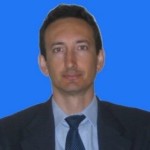 Born in Rome in 1968, Enrico Maria Carlini is currently head of Grid Planning and Interconnection department at Terna S.p.A., the Italian Transmission System Operator.
Born in Rome in 1968, Enrico Maria Carlini is currently head of Grid Planning and Interconnection department at Terna S.p.A., the Italian Transmission System Operator.
He has worked extensively with international associations, European commission and national regulator, producer and distributor utilities, renewables project developers and operators, global equipment suppliers, research centers and universities and lawyers; being an active contributor of the Italian Grid Code and Eu Network Codes grants him a well-set knowledge on European regulatory framework for the power systems, Eu financial assistance to infrastructure projects in electricity and on the wholesale electricity market and state aid in Italy.
In his career, he has been deeply involved in load flow calculation, dynamic security assessment and voltage stability, design of defense system and special protection schemes for the national transmission grid, mid and long term network planning, also focusing on the last decade’s rapid increase of renewable energy share into the electricity supply mix. He has over 20 years of experience carrying out security analyses and congestion management, cross-border capacity calculation, resource adequacy assessment and market probabilistic modelling.
He recently got back to the System Development after a long period of experience in System Operation at the Dispatching division, where he was first in charge of the Regional Control Centre for areas Center and South of Italy, and thereafter of the National Control Centre. In particular, he led the Management and Engineering of the Electric System dealing with the relationship and technical contracts with large prosumers, interaction with public administrations and the engineering of innovative equipment and tools’ control logics for the SCADA/ EMS system.
From 1993 to 1999, he developed a significant experience with Enel at the Engineering Department and in the field of generation, working at the thermal power plants of Torrevaldaliga Nord and Brindisi Nord. Prior to joining the electricity sector, he worked in the petro-chemical industry.
Mr. Carlini holds as well long-lasting leading roles in the key organizations of the energy community, among which IEC, IEA, ENTSO-E, Cigrè, RGI and Go15.
Graduated in M.Sc. Electrical Engineering with first class of honors (Planning Power System).
Title of the lecture: RES: the biggest match ever – Operational experience and innovative techniques to go cleaner, cheaper and safer
Abstract
Important changes in the provision and consumption of electricity services are now underway, driven by a combination of factors affecting the transmission sector of power systems. A variety of emerging distributed technologies – including flexible demand, distributed generation, energy storage, and advanced power electronics and control devices – are creating new options for power plants, consumers at the points of connection and the needed investments in grid infrastructure. At the same time, information and communications technologies, as well as small-scale and large-scale battery systems are rapidly decreasing in cost and becoming ubiquitous, enabling more dynamic and efficient consumption of electricity, demand response, charging electric vehicles, improved visibility and predictability of network dots and enhanced control of power systems. With this framework in place, from an operational point of view, issues such as security of supply, resource adequacy, the need of flexibility, resiliency and grid stability, TSO-DSO cooperation, observability and data management are becoming increasing important as intermittent renewables generation claims a greater share in the energy mix. The other way round, from a planning perspective, topics like transparency, stakeholder engagement, sustainability and nature conservation, economic viability, grid aesthetics to gain public acceptance and accelerate permitting processes are posing huge concerns for TSOs who have to set the stage for a significant grid reinforcement. The special session panel “RES: the biggest match ever” touches objective and topics related to the operational experience and innovative techniques put in place by Terna and the ENTSO-E community in order to cope with this complete paradigm shift away from centralized fossil fuel systems to a more decentralized, decarbonized, democratized, diversified, digitalized and disruptive model. Just no name a few:
- The energy transition and its challenges
- Software and hardware solutions to efficiently integrate renewable energy
- Climate change and the Italian resilience plan 2017
- European trans-(regional) TSO initiatives
- Resource adequacy Assessment and risk preparedness
- Energy storage solutions
- Underground cables
- Legal & regulatory framework: Clean Energy Package, European network codes and Italy’s national energy strategy 2017
Reinhold Bayerer (Infineon Technologies, Germany)
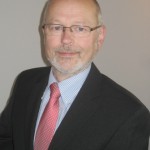 Reinhold Bayerer studied physics at the Technical University of Darmstadt, Germany and completed in 1979. He continued at this University as Research Associate and achieved his doctor’s degree in physics in 1985.He works in the field of IGBT Modules since then. A first paper on early IGBT-modules was given at PCI, Munich, 1987.He contributed to the fields of packaging technology, low inductance module design, test and application engineering, driver electronics, as well as manufacturing engineering. Several publications and patents may serve as a reference.
Reinhold Bayerer studied physics at the Technical University of Darmstadt, Germany and completed in 1979. He continued at this University as Research Associate and achieved his doctor’s degree in physics in 1985.He works in the field of IGBT Modules since then. A first paper on early IGBT-modules was given at PCI, Munich, 1987.He contributed to the fields of packaging technology, low inductance module design, test and application engineering, driver electronics, as well as manufacturing engineering. Several publications and patents may serve as a reference.
Today, he is Fellow for physics of power modules and working at Infineon Technologies in Warstein, Germany.
Title of the lecture: Power Circuits for Clean Switching and Low Losses
Abstract
The lecture will teach the various effects of parasitic inductance (LS) in power electronics. As power density and current density is continuously rising, parasitic inductance and resistance become more and more the limiting factors. The problem is the product inductance times current (LS*I) rising, simultaneously, if designs do not improve. Not only overvoltage during switching is the problem but for bipolar power semiconductors like IGBTs and freewheeling diodes, parasitic inductance causes disadvantageous current waveforms. In systems which have snubber capacitors additional to the DC-link capacitor and parasitic inductance in between, oscillations between these capacitors occur. When considering power semiconductors in parallel the current sharing of controlled devices like IGBT, MOSFET and JFET can be affected by the presence of small parasitic inductance. Parasitic inductance in the control circuit (gate circuit) decouples driver and the gates of the devices leading to increased short circuit current, for example. To introduce these topics the tutorial will start with the basics of switching inductive loads and discussion of related waveforms. Investigations on the different effects will follow. The discussion of paralleling will be accom-panied by case studies. Geometries of conductors and system design for low parasitic inductance and good current sharing will be another main part and the conclusions will summarize the benefits of related system design – clean switching and low losses
Michele Pennese (Mecaprom, Italy)
 After receiving the Master’s (Laurea) Degree in Electronic and Computer Engineering in 1988 at the University of Genoa, Michele Pennese developed an almost two decades experience in automotive components and electronic systems development at Weber and Magneti Marelli, focusing especially on innovative solutions applied to gasoline engines, transmissions and hybrid-electric powertrains.
After receiving the Master’s (Laurea) Degree in Electronic and Computer Engineering in 1988 at the University of Genoa, Michele Pennese developed an almost two decades experience in automotive components and electronic systems development at Weber and Magneti Marelli, focusing especially on innovative solutions applied to gasoline engines, transmissions and hybrid-electric powertrains.
After a five years time as Research & Development director at Micro-Vett, a leading Italian company specialized in outfitted electric vehicles production, he joined Mecaprom on March 2013 as Chief Technical Officer of Vehicles & Powertrain Systems area, afterwards was appointed Director of the Mechatronic System business unit, responsible of the design, development and application of integrated mechatronic systems and electrified powertrains.
He is qualified as Inventor at the European Patent Office, lecturer at universities seminars and international conferences.
Title of the lecture: The revenge of electric vehicles: from regulations to technologies scenario
Abstract
An overview on the technological development of the electrified powertrains due to regulations and markets trends, reported to the history of propulsion systems at the origin of road vehicles.
The lecture deepens the effects of European regulations roadmap released by Transportation and Health Commissions on car makers and components suppliers development policy, focusing on the electrified powertrain architectures and related performances.
Finally a mention on conductive charging systems and a perspective of potential future development.
Link to past editions lecturers



